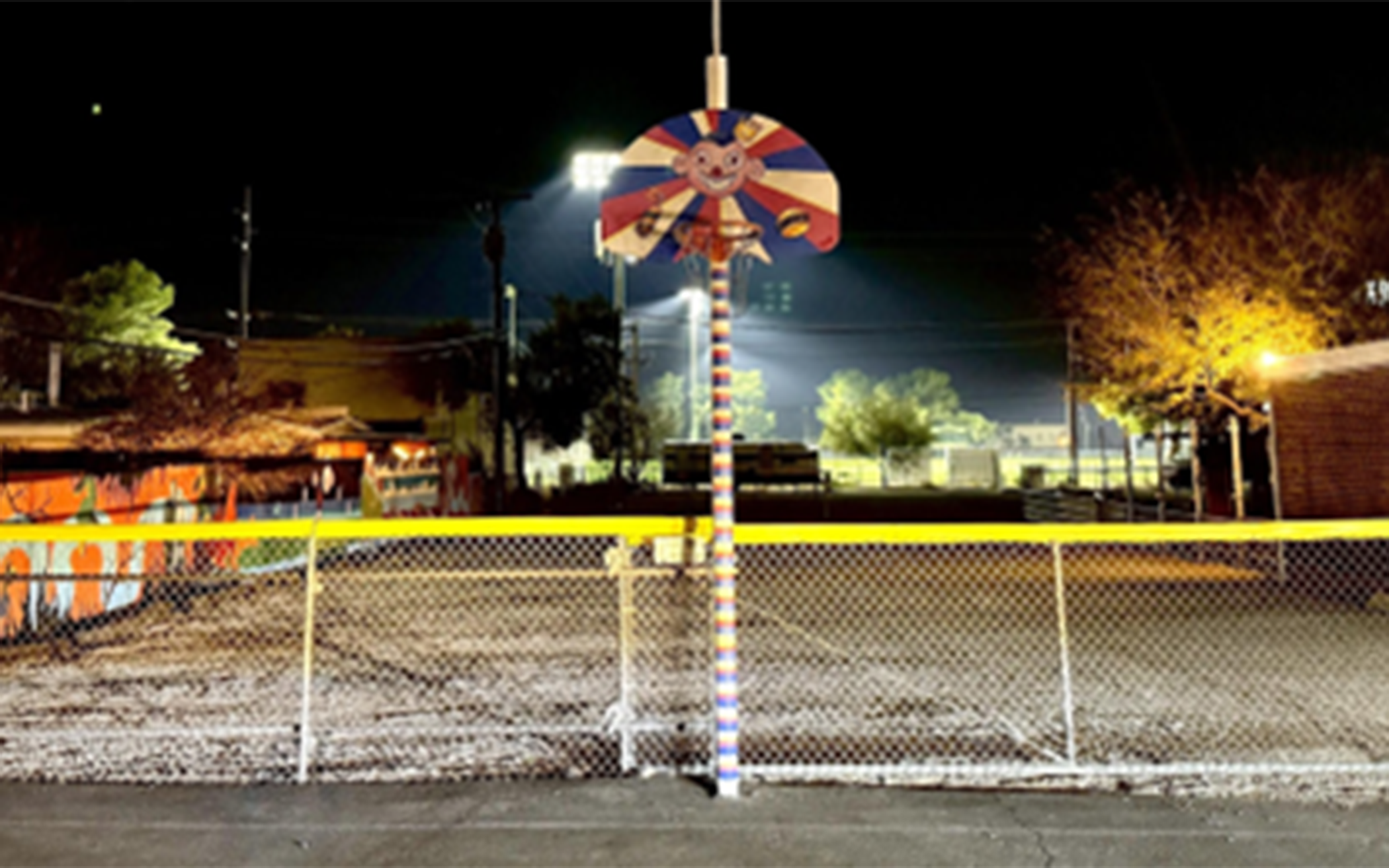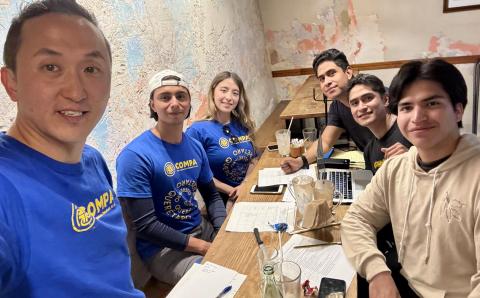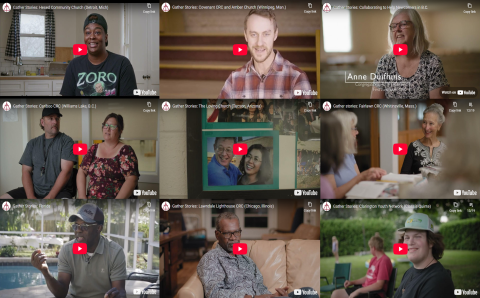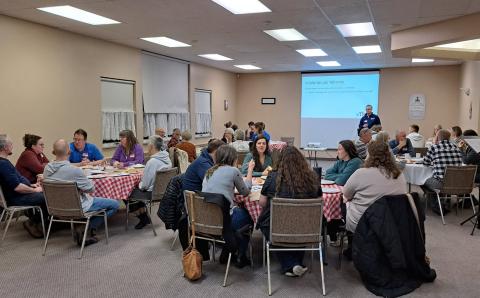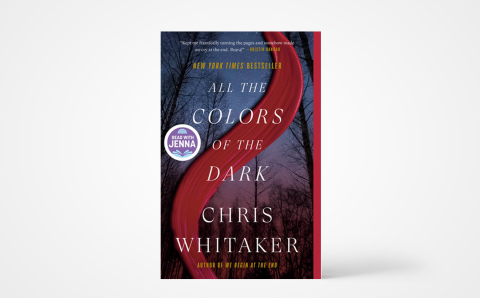A woman in distress lies sprawled on the asphalt in front of the church in the eerie glow of a faint LED streetlight that is about to flicker out. Above her towers a basketball hoop with a toothy, grinning pink-faced clown painted on the backboard. A diverse cast of characters surrounds the woman. A nervous young man paces, sometimes praying, sometimes biting his fingernails. A newly hired school psychologist is on her knees, bending over the woman and seeking to understand her plight. A recently ordained minister anxiously tugs at the strap of his crossbody bag, wanting to go home so badly but not before he can rest assured that everyone is safe. A young bodybuilder stands nervously by the chain-link fence trying to decide what to do with his physical strength, which overshadows his insecurity about his role in this place. Another man stands with arms crossed, expressionless despite being dressed like a court jester, down to his curly-toed shoes and a floppy, red four-peaked hat with bells hanging on it like little Christmas tree ornaments. The woman’s mother is careening down the road in a large SUV to meet her sister, who is jumping up and down in panic next to the curb. I am standing under the basketball hoop assessing the situation. Under a nearby minivan there is an open penknife, barely visible until it glints in the approaching SUV’s headlights.
This is not the scene we expected to encounter upon exiting the side door of the church to go home for the evening.
I am the pastor of the little flock called Mission Church in Tucson, Ariz. The people in the parking lot were mostly from my church, people I know and love. This was a very rough day for them, for reasons I still don’t fully know. They needed guidance from someone who cared. There I was.
Emotionally Disconnected
But here’s the thing. I am not who you think I am.
Let me tell you a story:
I’m at McKale Memorial Center, the copper-clad oval arena that’s home to the Arizona Wildcats basketball team. Cats games are the premier sports experience in Tucson. We don't have any professional sports franchises, but as the video scoreboard reminds people at every game, we feed the National Basketball Association with talent. This is the place where we fans yell "SUCKS!" after the announcer names each of the opposing starters. This is where we boo the refs incessantly. This is where we openly ridicule young men for failing to sink a shot from 23 feet away. “AIRBALL!”
I am at the arena because a friend from church invited me. We are sitting at the upper edge of the lower level, enjoying the entertainment and fanfare. We join the crowd in expressing emotions and sentiments that would normally be considered extreme and unacceptable.
It's halftime, and to keep the crowd engaged, the local pool and spa company has set up a game for audience members to participate in. A spa is placed under one of the basketball hoops, and several spectators are chosen to line up at the free throw line on the other side of the court. To win the spa, all someone has to do is throw the basketball down court and get it to bounce into the spa. This is much easier than making a half-court shot. The first young man heaves the ball down court and just misses. The crowd groans with disappointment. The moderator instructs him to run after the ball because he’ll get to try again. The next contestant, a portly woman, approaches the free throw line. She gives the ball the heave of her life, but it barely makes it to half court before slowing to a meandering roll. Not even close. The audience lets out a collective chuckle at her inability. She begins to run after the ball for her second attempt. I am caught up in the moment and the encouragements of the crowd.
As the woman jogs after her ball, she stumbles. At first she is able to right herself, scuffling slightly to the left but staying upright. But she overcorrects, and her shoe catches on the glossy court. Her legs fly out from under her, and her arms spread outward. She begins to fall into a full bellyflop. Time slows down, and she hangs midair for what seems like a minute until—WHAP—she face-plants onto the logo at center court. Everyone in the stadium, all the mockers and the critics, gasp and fall dead silent—all except for one. One young man erupts in ear-splintering laughter at her misfortune. The laughter lasts only for a second, because everyone turns to look at him with utter disdain. How could anyone be so heartless?
That young man is me.
I am emotionally disconnected.
A Life History
I grew up in churches that believed—I mean really believed—in the spiritual realm. Behind every new world leader, body rash, and lightning strike there was a sinister being messing with us, God's will, and the nation of Israel. We saw evil everywhere except in places we didn't think to look.
My parents were and are sweet people. I grew up knowing that I was unconditionally loved. Even when I failed profoundly, I never once considered that the love of my mother and father was in jeopardy. In my mind I have layered this experience onto the face of God. The idea that, to quote Jack Miller, “we are more loved and accepted than we’d ever dare hope” resonates deeply with me. I believe it. I have tasted of that fountain, and it refreshes the soul.
My father learned to love from the book Little Britches, in which Ralph Moody tells stories of his childhood relationship with his father. He learned it there because my father’s father was deeply disappointed in him and let him know about it. Today we would call it emotional abuse; back then they called it “tough love.” His dad hurled insults at him, especially after his dad had been drinking. He called my dad stupid and slow. My dad learned to keep his mouth shut and disappear. He spent most of his time walking in the great outdoors. When home, he obsessed over learning the guitar using his Chet Atkins songbook and watched his devoted Lutheran mother paint desert scenes in the back room.
My mother, Betty, grew up with three sisters. She and Bonnie were twins. Their father, a cowboy, escaped the Dust Bowl by moving westward and settling in Colorado. They were poor, but they could reinvent themselves. When she was in college, my mom stumbled into a vibrant spiritual community, a Pentecostal campus ministry. As her family members reinvented themselves in light of an unraveling dream, she found people who saw visions and dreamed new dreams. She and her sisters found themselves moving onward and upward in their education and their faith. My mom became a teacher, then opened a bookstore on the main street of a small town in Oregon.
My dad, Leroy, moved to Oregon after his draft duty during the Vietnam War ended, and he frequented the bookstore on the main street of his small town because he was looking for an out-of-print Ralph Moody book called Shaking the Nickel Bush. My mom’s business partner was sure he was actually trying to get to know Betty, so she talked my mom into asking him out. Later my dad would tell me that he actually wasn't there for Betty, but he was glad she approached him. They married soon after, as they were getting “up in age.” The quiet man who had learned to escape scrutiny married the vibrant Pentecostal convert who was used to going toe-to-toe with her twin sister. And then they had me.
I am the only child of Leroy and Betty Littleton. Like my mom, I have big ideas and the risk tolerance to go for them. Like my dad, I like having space to unpack how I feel, and I have a profound fear of being subject to destabilized people. Unlike my mom and dad, I grew up with my mom and dad as parents.
My mom had profound emotional needs and experiences, so I looked for validation and guidance from my dad. But he was so reserved, and I found myself frustrated with the lack of verbal communication. My mom was easier to talk to, but I slowly began to resent that she was using me as an emotional sounding board and not a kid. I installed a slide lock on the inside of my bedroom door to keep her out. It wasn't until years later in therapy that I realized this wasn’t normal. The evil wasn’t just in that crooked politician or the war in the Middle East. Satan was at work in our house, entering through the simple longings of our hearts and the strategies we came up with to fill them.
I remember the day I felt the demonic powers. My Aunt Maria, my mom’s youngest, most vibrant sister, had just died. She was my favorite relative, someone who brought out the best in me. One of my favorite photos is one of me wearing a pillow on my head as a hat and she and I busting up in laughter. I think that was the same visit where she took me to a museum to learn more about baseball. Then and now, museums and baseball are two of my favorite things. She understood me. And then she died. She died first among the sisters, and way too young. The family was devastated. Like my dad, I needed to unpack what I was feeling. My mom needed someone to express her emotions to, and my dad didn't know how to meet her there, so she pursued me and my ability to connect with her. My feeling that this wasn’t my role (though I couldn’t name it at the time) rose up, and I became a stone, cold and impenetrable. I said words I’ll always regret. I looked her in the eye as she was telling me how much she missed Maria and said, “I don’t even care that she’s dead.” It was a lie from the pit of hell.
Ever since that day I have been emotionally disconnected. I can tell when something should elicit an emotion, but I’m like a broken electrical circuit. When the switch flips, and the current should flow, I feel nothing. I’m disconnected.
I have been working out my story and seeking God’s help with this issue for about 16 years. I’ve written volumes about what I’ve learned and seen and could write more. And it’s helping. I am grateful to say that when my dad died of cancer, the circuit worked flawlessly. I sat with him on the hospital bed and openly shared my feelings, and as mercifully warm tears flowed down my cheeks, I knew I was fully human. But sometimes the circuit doesn’t work. The connection is sporadic. There are times when I’m unsure or under duress, and I feel nothing.
The Gift of Composure
So there I am in that parking lot. I am scared. I am worried about the woman on the ground. I am nervous about the man dressed as a jester. He creeps me out. The careening SUV introduces unwanted chaos to the situation. And my emotional circuit is broken.
But nobody could tell.
At some point, as I often do, I gave some directives. “You, get the knife and lock it away!” “Give her space.” “We need to clear the parking lot. It's time for everyone to go home.” “OK, let’s help you into the car.” Then I got in my truck, closed the door, laid my head against the headrest and acknowledged the feelings of fear, anger, and inadequacy. It was time to go home to my family.
My brokenness is my gift. My emotional switch doesn’t always work on the first try, so I am able to stay composed for much longer than many others. But the switch can and does work. I am increasingly able to feel love, and fear, and concern, even if it takes a little while.
God redeems what the enemy seeks to destroy.
About the Author
Andy Littleton is a pastor at Mission Church, a local mission leader in Resonate’s Western U.S. region, and co-founder of Infuse, a missional consulting group. He lives with his wife and daughter in Tucson, Ariz.

